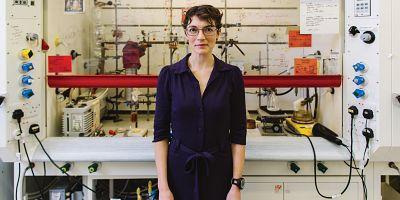Science Festival interview with Professor Polly Arnold
Professor Polly Arnold of the University's School of Chemistry hosted a discussion of optogenetics, an emerging tool for human brain research in which light is used to control neurons, in 'Shining a Light on the Brain' at the National Museum of Scotland at 1pm on Sunday 19 April.
Professor Arnold was joined by the inventor of optogenetics Professor Gero Miesenböck and Dr Katie Jennings, both from the University of Oxford, and Dr Alexandre Mourot of Pierre and Marie Curie University in Paris to explore the potential benefits and risks of this new field.

What can people coming along to your event expect to hear?
The audience can expect an accessible introduction to the field of optogenetics from one of its inventors, Gero Miesenböck, and a lively discussion between him and two other scientists who have taken this discovery off into new directions.
Optogenetics, in a nutshell, is the use of light to control neurons which have been genetically altered to contain light-sensitive proteins.
What do you hope audiences can get out of coming along to the Science Festival?
I hope they are both entertained and educated. I hope they learn something new in a relaxed environment that really allows them to think about science in the wider context.
For example, optogenetics is a young and exciting area of science, and I think many people will know only a little about it. This is an unusual opportunity for audiences to ask questions to leaders in a field that probably has nothing to do with their own job.
Maybe a student from a different research area will attend and have a eureka moment.
Why is taking part in the science festival important to you?
Universities are a central part of every major city, and we no longer inhabit ivory towers. We can contribute, and also learn a lot from, activities like this that bring together government, society, and people of all ages and from all backgrounds.
Many Edinburghers outwith the university are very intelligent, and engaged; many are also very well educated, whether by universities or otherwise. This festival creates important opportunities for all our communities to mix.
I wish that we could run more free events, to help us reach even further.
What impact does your day-to-day work have on society?
Right now, none whatsoever - except of course the students I'm working with, who will go out into the world to do amazing things and solve important problems.
We make unusual molecules to explore fundamental structures and reactivity using heavy metal elements, which are hard to make computational predictions about.
We have made some molecules that show unprecedented transformations of carbon monoxide, and a new mechanism of selectively functionalising unsaturated hydrocarbons, known as arenes, which could lead to new catalysts in the future.
Also we have shown new chemistry for uranyl, the most persistent environmental form of uranium, which has challenged and may help spectroscopists who are trying to understand complex nuclear waste behaviours.
How does your work with non-scientists affect how you carry out your day-to-day role?
I don't think it makes any difference. When I'm at work, I'm completely focused. You have to think deeply to do good science. It's tough to find the time to do this.
How does engaging with the public challenge you?
I find interacting with people very difficult. I am happiest and most creative when I'm wearing ear plugs working in my office or running across the Pentland Hills in the sunshine.
Engaging with the public reminds me that I'm paid by the tax payer and that I owe them an explanation of why the fundamental research we do is important. I hope it also makes me a better lecturer and teacher.

